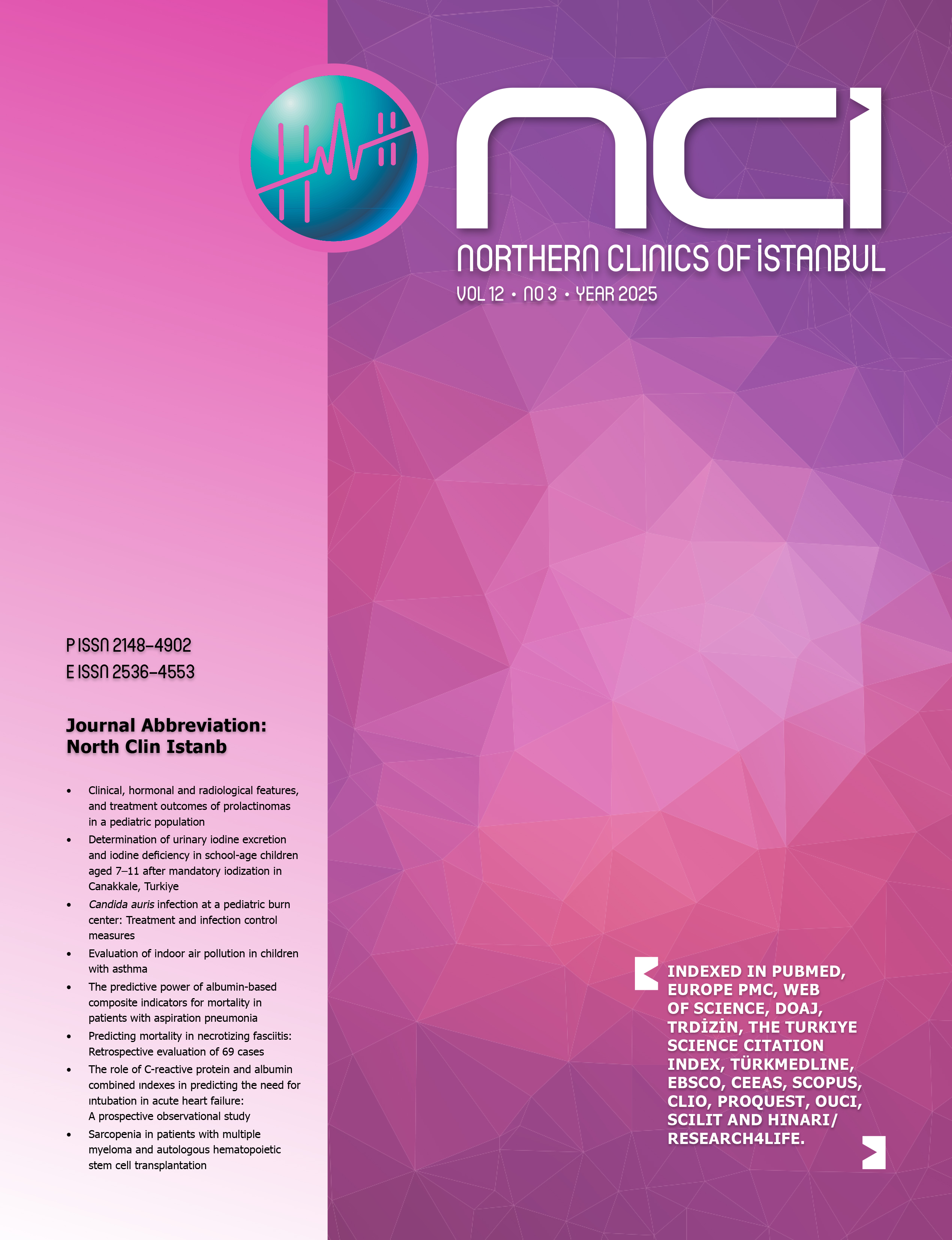The effects of Vasoactive-Ventilation-Renal score on pediatric heart surgery
Erkut Ozturk1, Ibrahim Cansaran Tanidir1, Mustafa Gunes2, Serhat Bahadır Genç2, Okan Yildiz2, Ismihan Selen Onan2, Sertac Haydin2, Alper Guzeltas11Department of Pediatric Cardiology, Istanbul Saglik Bilimleri University Mehmet Akif Ersoy Thoracic and Cardiovascular Surgery Training and Research Hospital, Istanbul, Turkey2Department of Cardiovascular Surgery, Istanbul Saglik Bilimleri University Mehmet Akif Ersoy Thoracic and Cardiovascular Surgery Training and Research Hospital, Istanbul, Turkey
OBJECTIVE: The effects of Vasoactive-Ventilation-Renal (VVR) score on the evaluation of pediatric heart surgery results were investigated in this study.
METHODS: This retrospective study included children younger than 18 years of age who were operated for congenital heart disease between was July 1st- December 31st 2018. Patients who needed ECMO support at the first postoperative 72 hours were not included in the study group. The postoperative initial, 24th and 48th-hour Vasoactive-Inotrope Score (VIS) and VVR scores of all patients were calculated in the intensive care unit (ICU). The effects of these scores on lengthy ICU duration (PCILOS, duration more than the upper 25th percentile) and to the hospital mortality (before 30 days) were evaluated.
RESULTS: There were 340 patients in this study. The median age was 12 months (1 day-18 years), and the median weight was 7 kg (2.5 -82 kg). 18% of the patients had single ventricle physiology. Total correction was performed in 88% of the patients. Median RACHS 1 score was 2 (16). PCILOS was>112 hours and total mortality was 4%. The 0th hour VVR ICU c index=0.73 (CI: 0.700.77), mortality c index=0.77 (CI: 0.690.85). VVR at 24th hour ICU c index=0.75 (CI: 0.710.79), mortality c index=0.86 (CI: 0.810.91). VVR at 48th-hour ICU c index=0.87 (CI: 0.820.92), mortality c index=0.92 (CI: 0.870.97). The VVR score at 48th-hour was a strong indicator for the prediction of both LICU duration (odds ratio [OR]: 1.44; p=0.001) and hospital mortality (OR: 1.28; p=0.001).
CONCLUSION: The postoperative VVR score can be a strong determinant for the prediction of early clinical results in congenital heart disease patients, which were considerably a heterogeneous group.
Vasoaktif-ventilasyon-böbrek Skorunun Pediyatrik Kalp Cerrahisi Operasyonu Sonuçlarına Etkisi
Erkut Ozturk1, Ibrahim Cansaran Tanidir1, Mustafa Gunes2, Serhat Bahadır Genç2, Okan Yildiz2, Ismihan Selen Onan2, Sertac Haydin2, Alper Guzeltas11Department of Pediatric Cardiology, Istanbul Saglik Bilimleri University Mehmet Akif Ersoy Thoracic and Cardiovascular Surgery Training and Research Hospital, Istanbul, Turkey2Department of Cardiovascular Surgery, Istanbul Saglik Bilimleri University Mehmet Akif Ersoy Thoracic and Cardiovascular Surgery Training and Research Hospital, Istanbul, Turkey
Giriş ve Amaç; Bu çalışmada çocuklarda Vasoaktif-ventilasyon-böbrek(VVR) skorununun pediyatrik kalp cerrahisi sonuçlarını değerlendirmekteki etkisi araştırıldı.
Materyal ve Method: 1 Temmuz 2018- 31 Aralık 2018 tarihleri arasında prospektif olarak, konjenital kalp cerrahisi operasyonu yapılmış olan 18 yaş altı olgular üzerinde gerçekleştirildi. İlk 72 saat içinde ECMO desteği gereksinimi olan olgular çalışma dışı bırakıldı. Operasyon sonrası yoğun bakıma alınan olguların başlangıç, 24.saat ve 48.saat Vazoaktif inotrop skoru(VİS) ve VVR skorları hesaplandı. Toplam kalış süresinin % 25 persantilinden uzun kalma olarak değerlendirilen; uzun yoğun bakım süreci (UYB) ve hastane mortalitesine(<30 günden önce) etkileri değerlendirildi.
Bulgular: Çalışmada 340 olgu mevcuttu. Olguların median yaşı 12 ay ( 1 gün-18 yaş) ve median ağırlık 7 kg( 2.5 -82 kg) idi.Olguların %18i tek ventrikül fizyolojisine sahipti ve %88 olguya total koreksiyon yapılmıştı. Median RACHS 1 2 (1-6) idi. UYB süresi > 112 saat ve total mortalite % 4 idi. VVR 0.saat UYB c indexi= 0.73( CI: 0.70-0.77), mortalite c indexi= 0.77( CI: 0.69-0.85) idi.VVR 24.saat UYB c indexi= 0.75( CI: 0.71-0.79), mortalite c indexi= 0.86( CI: 0.81-0.91) idi.VVR 48.saat UYB c indexi= 0.87( CI: 0.82-0.92), mortalite c indexi= 0.92( CI: 0.87-0.97) idi 48.saat VVR skoru hem UYB süresi (odds ratio [OR] 1.44; P = 0.001) hem de hastane mortalitesini (OR 1.28; P = 0.001) ön görmede güçlü bir belirteçti.
Tartışma ve Sonuç: Oldukça heterojen yapılı konjenital kalp olgularında operasyon sonrası VVR skoru; erken bir zamanda klinik sonuçları öngörmede güçlü bir belirleyici olabilir. (NCI-2019-0259.R1)
Manuscript Language: English





















